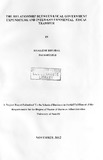| dc.description.abstract | The introduction of centrally independent municipal budget laws is a major step towards
sorting out local financing and providing a basis for distinct municipal self-government.
The discrepancy between legal provisions for fiscal autonomy and actual conditions for
its practical application is deepened by the fact that many central governments still prefer
to maintain control over major local taxes and other local revenue sources. This has
contributed to huge contradiction as the public expects service delivery from their local
government yet the finances for provision of such services are bestowed at the central
government and its agencies at the provinces and districts level. The study sought to
analyze the relationship between local government expenditure and inter-governmental
fiscal transfer.
In methodology a survey research to explore the existing status of two or more variables
at a given point in time. In this study, the researcher preferred to carry out survey on
impact of intergovernmental transfer using a relationship model. The population of this
research consisted of 40 local authorities in Kenya. The researcher utilized secondary
sources to collect the data. The sources were obtained from the treasury and the ministry
of local government. Qualitative data was analyzed using content analysis techniques.
For quantitative, descriptive statistics, percentages and frequencies were derived and
used.
From the findings each of the predictor, variables (Grants, Tax price and Private income)
explain variation in the dependent variable (local government expenditure). In addition
grants, tax price and private income significantly influences Local government
expenditure. Meanwhile, the results of this study suggest that the local fiscal capacity,
which is reflected from the local own revenues have not distributed evenly across the
local authorities. Local own revenue, and grants and transfer, each individually, have a
significant effect on the local government expenditure. Finally, it can be concluded that
the experience of regional autonomy with fiscal decentralization policy has encouraged
local governments to increase regions fiscal capacity. The local government expenditure
is thus positive and significantly influence the inter-government fiscal transfer | en |

